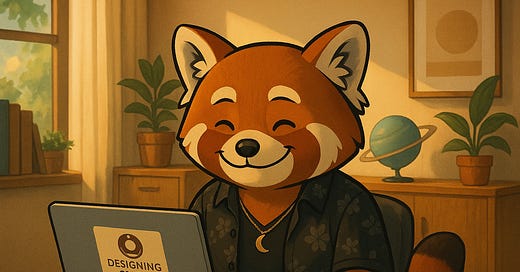There was a time when I thought growth meant collecting insights. Naming shadows. Spotting patterns. Diagnosing what was off in myself, in others, in the world. For a while, that work mattered. It built my understanding. It gave me language. It even built a little community now and then—like the mental wellness open mic nights I hosted, where we came together not just to share struggles, but to celebrate progress, humor, and the simple relief of being witnessed without judgment.
But lately, I’ve felt a shift. Growth, for me now, feels less like collecting and more like applying. Less about solving the grand puzzle of life and more about weaving small threads of care into my everyday spaces. A decal project at work that might help normalize invisible disabilities. A better tone in the emails I send—even if they’re just about vinyl and printing. Quiet shifts that don’t announce themselves as “personal development” but carry the essence of it.
And underlying it all, an old idea I’m rediscovering in a new light:
We all approach life with different patterns—not flaws, not limits, but strategies.
Personality types, for me, aren’t just labels anymore. They’re clues to how each of us naturally contributes. Some of us plan for the future. Some hold the emotional tone. Some spark action. Some challenge assumptions. Growth now means honoring those patterns, softening where they constrict, and offering them where they’re most needed.
Not to change the world overnight.
But to be the kind of influence that makes change possible—without forcing it.
---
I’ve noticed that many of us—especially those drawn to self-awareness and personal growth—hit a point where we start to carry the quiet weight of should.
We should be doing more.
We should be making a bigger impact.
We should be farther along.
And when we combine that with the stories culture feeds us—the myth that "real change" requires grand gestures or flawless readiness—it can become paralyzing. We end up preaching to ourselves and others, urging betterment, pushing for some distant ideal of a healed world.
But what if that pressure is the problem, not the solution?
The more I pay attention, the more I see that most meaningful change doesn’t come from heroic leaps or final victories. It comes from individuals leaning into their natural patterns, offering their skills and perspectives where they already are. Not waiting for perfect opportunity. Not waiting for the world to align with their ideals. Just living into their dharma—their particular role in this strange, evolving play.
For me, that’s meant recognizing that while I’m not a therapist, mental health shows up everywhere I go.
In the way I host conversations.
In how I frame problems at work.
In the design choices I make.
Even in the humor I use to help people relax and remember their agency.
I don’t have to build a movement.
I just have to let my natural patterns influence the spaces I already touch.
---
I’ve also had to let go of the idea that there will ever be a finish line.
After every war, new conflicts arise.
After every cultural shift, new complexities emerge.
The world doesn’t take a break.
And it probably never will.
That’s not cause for despair. If anything, it’s permission.
Permission to stop waiting for the perfect moment, the flawless plan, or the guaranteed outcome.
Permission to work within the scale that life has offered me.
To honor the opportunities that exist, rather than mourning the ones that might never come.
Much like passing a baton in a relay, my role isn’t to carry the weight forever. It’s to move it forward while I can, trusting that others will continue the work in their way. And that’s enough. It has to be enough.
So when I think about what I want to offer now—in my writing, my work, my relationships—it’s not answers or strategies or diagnoses. It’s this simple, recurring invitation:
Let’s bring our values into the real world, however we can.
Not in ways that exhaust us.
Not in ways that prove our worth.
But in ways that feel like care.
Let’s make joy a valid contribution.
Let’s make small, consistent actions an acceptable form of growth.
Let’s honor our natural patterns, our personalities, and our limits as part of the process—not obstacles to overcome.
And above all, let’s remember:
We don’t have to save the world.
We just have to participate in it—with integrity, with humor, and with whatever gifts we’ve been given.





